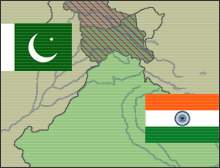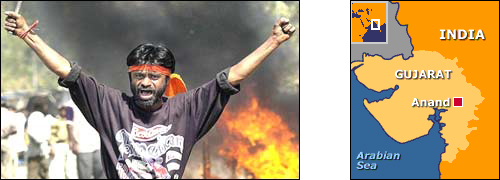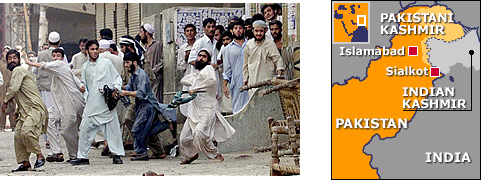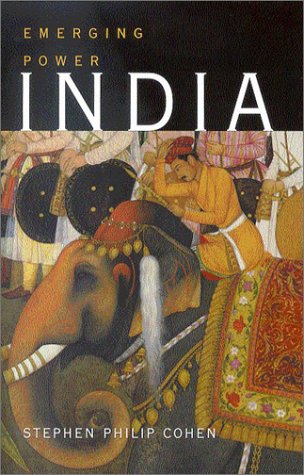India and Pakistan: Independent but not Free
This article was published in The Daily Star 08.16.03 and will be published in the Foreign Policy in Focus, The Globalist, Beliefnet and the Muslim Observer.
August 14th and August 15th mark the 56th anniversary of the independence of Pakistan and India from British colonialism. In a sense it is the independence of India and the birth of Pakistan whose history begins only after decolonization. It is a sad commentary on the political condition of South Asia that even though the region has been independent for over half a century, it is still not free.
 Today, both India and Pakistan are gripped in the frenzy of religious fervor that is fundamentally negative in its orientation. Religious anger, activism and mass mobilization in both nations is mobilized against some thing rather than standing for something.
Today, both India and Pakistan are gripped in the frenzy of religious fervor that is fundamentally negative in its orientation. Religious anger, activism and mass mobilization in both nations is mobilized against some thing rather than standing for something.
India’s religious revival is taking the form of a Hindu nationalist movement that is rabidly opposed to secularism and its religious minorities. Hindutva – the Hindu nationalist movement in India – showed its true saffron in March 2002 when it used the burning of a train by Muslims rioting against molestation of women that killed 60 passengers by unleashing a state sponsored pogrom that slaughtered, murdered and burned alive over 2000 Muslims. Nearly two hundred thousand Muslims were dispossessed of their property, had their businesses and livelihood destroyed and they overnight became refuges in their own home land. Today, thanks to the Hindutva movement, the color saffron stands more for the color of Muslim blood than Hindu faith.

Compare the response of Americans to the attacks of September 11th when officials rushed to protect America’s Muslim minority with that of India’s where government officials, both politicians and bureaucrats, worked with the mobs to facilitate the massacre, and one will quickly realize that in Gujarat the stench of burning flesh was mixed with the stench of the burning of India’s secularism, pluralism, democracy and hopes for freedom.
Perhaps in terms of shock value and implications for the future, the Hindutva movement had perpetrated the worst crime against India’s soul since its independence. The events of Gujarat will come back to haunt India as it aspires for international recognition and seeks an important role in global governance. Nations which harbor desires of global leadership cannot at the same time harbor mass murderers in leadership positions.
In Pakistan, the call to apply Islam in the public sphere quickly degenerates into violence against some religious minority. Muslim extremists continue to enjoy great freedom in Pakistan. They seem to have only one purpose in life, to find a community that they can hate and target for violence. Ahmadis, Shiis, and Christians have all experienced the violent hatred of “Islamization” in Pakistan. In the last ten years, religiously motivated sectarian violence has taken thousands of lives in Pakistan and prevented the emergence of a stable state, or the establishment of a safe society. Democracy still remains only a plausibility in Pakistan.

With the growing Talibanization of Pakistan – thanks to America’s war on terror — and the emergence of extremely odious characters such as Maulana Fazlur Rahman as a prominent political force the future of Pakistan remains deeply entangled with religious hatred and violence. If religious parties do not immediately eschew the path of rhetoric and ideology and adopt more moderate and pragmatic programs it is but a matter of time that Pakistan itself will become a victim of terrorism by Muslim militants and most certainly the next stop in America’s war on terror.
Besides giving religion a bad name, religious zealots have only contributed to the destabilization of South Asia and heightening the prospects of a nuclear disaster. As religious extremists jockey for positions of power in India and Pakistan, their past record and the prospects of seeing their murderous hands on nuclear triggers is rapidly becoming a source for nightmares for security experts in the region and elsewhere.
Both India and Pakistan are deeply traditional and religious societies. It is difficult to expect them to become completely secular. Somehow the two nations must find a way to accommodate the political impulses of their faith based communities without undermining the civil liberties of minorities, without disrupting political and economic development and most importantly without raising nuclear security dilemmas.
Today, religious zealots in both nations remain a domestic as well as an international threat. Both India and Pakistan, in spite of all their wars and the political and social turmoil, have progressed economically as well as technologically. Both are poised to break away from their low-income status and become middle income, industrializing and globalizing nations. Both nations have large international diasporas that can help bring in FDI, technology, and international business.
 India is already well situated to become a major economic and cultural power worldwide. Indian culture through the popularity of Indian cinema is already giving India the kind of soft power that only America enjoys worldwide. India is now acknowledged as a software giant. With its huge pool of management and tech experts it alone can compete with China for the status of the next global power.
India is already well situated to become a major economic and cultural power worldwide. Indian culture through the popularity of Indian cinema is already giving India the kind of soft power that only America enjoys worldwide. India is now acknowledged as a software giant. With its huge pool of management and tech experts it alone can compete with China for the status of the next global power.
Pakistan’s credentials as a nuclear power, and its current role as the frontline state in the war on terror, has forced the world to finally accept it as an important global player. Pakistanis in Europe and America are also developing their own tech-centered capabilities that will contribute to Pakistan’s development.
It looks as if “God” alone stands between success and disaster in South Asia. The competing processes of economic and technological growth and religio-political degeneration manifest a unique example of the phenomenon as simultaneous integration and disintegration described by Benjamin Barber as Jihad versus MacWorld. It is a tragedy that even after independence, India and Pakistan remain slaves to their own demons.
Religion should empower not enslave. Religion should enlighten and ennoble humanity not make beasts out of humans. Religion is the source of ultimate peace, it should not become the source of conflict.








